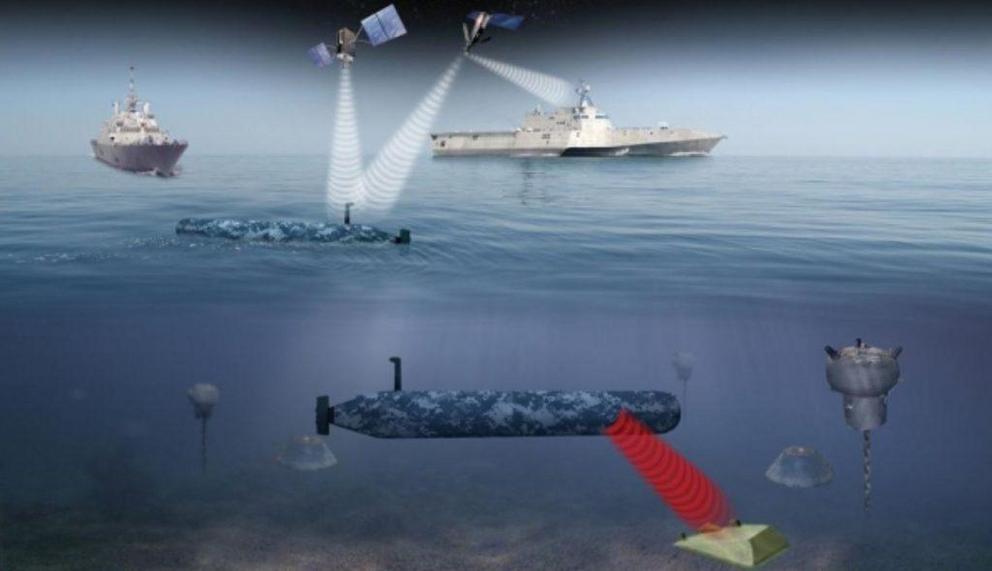Google quits drone program; US Navy wants drone motherships with help of AI
The U.S. Navy and researchers from Florida Atlantic University are developing a boat for drones (aerial and sub) that can be launched from a mothership to protect U.S. coastal waters. Meanwhile, Google which was heavily invested in Project Maven, has announced its departure from its help with the controversial artificial intelligence program for use with analyzing drone footage eventually allowing the drones to self-learn.
“Our focus will be on developing a multi-vehicle system that can safely and reliably navigate coastal waters with a high level of autonomy while performing assigned tasks,” Manhar Dhanak, director of SeaTech, the Institute for Ocean and Systems Engineering in FAU’s Department of Ocean and Mechanical Engineering, said in a press release.
The FAU researchers will seek to develop new software tools for better sensing and collision avoidance for the drones as well as to allow the ship “to serve as a docking station” and power sub and air drones that fasten onto it, according to a statement from the university. One aspect of the struggle for researchers is developing software to help the surface craft obtain a clear picture of obstacles to avoid and potentially hostile targets in the area, to help the drones better plan routes and paths for different missions.
This is presumed to be Google’s involvement with Project Maven, which Google recently denounced support for and stated the company would not be renewing the military contract and would stop in 2019. This comes after extensive blowback from employees and a petition against the deal with the U.S. government, demanding the engagement end, as well as an agreement to never get involved with the military again. At least a dozen staff resigned over the issue.
Google Cloud CEO Diane Greene announced the decision at a meeting with employees Friday morning, Gizmodo reported.
Google would not choose to pursue Maven today because the backlash has been terrible for the company, Greene said, adding that the decision was made at a time when Google was more aggressively pursuing military work. The company plans to unveil new ethical principles about its use of AI next week.
However, the agreement was already signed, so the company is locked in for another year until the c0ntract runs out in March 2019. Google can then legally stop assisting the government with the advancement of artificial intelligence for use with its drones, a nightmarish scenario that brings glimpses of the movie The Terminator to mind.
Google’s pursuit of the contracts is alarming, but the leaked emails are even more startling as we are given an insight to how Google’s top employees involved with the contract think.
The internal leaked emails show Google executives excited, viewing Project Maven as a golden chance to open doors for more future business with the military and intelligence agencies on big money contracts, The New York Times reported.
Google publicly defended and downplayed its work on Project Maven, with senior executives stating that the contract is of little value to the DoD and that its contribution amounts are in comparison to providing open-source software TensorFlow to the Defense Department. The emails, however, show quite the opposite. Google and its partners were directly working on developing machine learning algorithms for the Pentagon, with the goal of creating a sophisticated system that could surveil entire cities for the agency.
The emails further show that employees were worried about the public’s perception of the contracts.
“It’s so exciting that we’re close to getting MAVEN! That would be a great win,” Fei-Fei Li, chief scientist for AI at Google Cloud, wrote in a September 24, 2017 email. “I think we should do a good PR on the story of DoD collaborating with GCP from a vanilla cloud technology angle (storage, network, security, etc.), but avoid at ALL COSTS any mention or implication of AI.”
“Google is already battling with privacy issues when it comes to AI and data; I don’t know what would happen if the media starts picking up a theme that Google is secretly building AI weapons or AI technologies to enable weapons for the Defense industry,” Li added.
A DoD statement from last July announced that Project Maven aimed to “deploy computer algorithms to war zones by year’s end.”
It is not known if the Florida Atlantic University is involved with Project Maven or an offshoot of the operation. However, both projects deal with drones and artificial intelligence so it’s a lucky guess.
When the military has a drone mothership in the sky like in the movie Captain America: The Winter Soldier we can all thank Google for helping push the efforts, in the beginning at least. Whether you like it or not, artificial intelligence is slowly but surely seeping into society. Activist Post previously reported that A.I. is taking over jobs in everything from hospitals, to finance and even now talks of robot journalism.
I’ll leave you with a robot that wants to destroy all humans. Laugh it up now, but there’s a reason Tesla founder Elon Musk said artificial intelligence is potentially more dangerous than nuclear weapons. All those robot apocalypse movies are quickly catching up to humanity and look like our foreseeable future.

